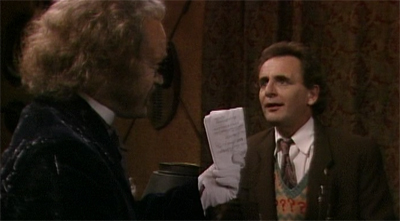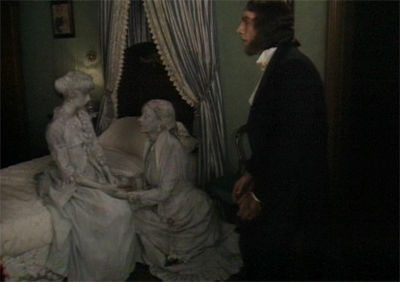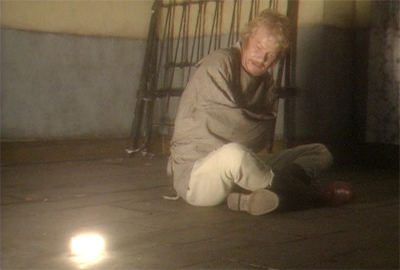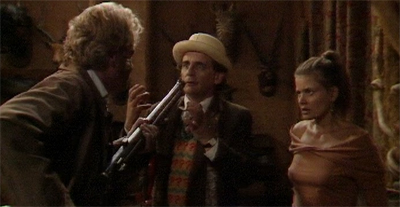To celebrate the fiftieth anniversary of the longest-running science-fiction show in the world, I’ll be taking weekly looks at some of my own personal favourite stories and arcs, from the old and new series, with a view to encapsulating the sublime, the clever and the fiendishly odd of the BBC’s Doctor Who.
Ghost Light originally aired in 1989.
Sir, I think Mister Matthews is confused.
Never mind, I’ll have him completely bewildered by the time I’m finished.
– Gwendoline and the Doctor may as well be talking about the audience
Ghost Light is rather infamous as the “impossible to follow” story from the final year of Doctor Who, the episode that doesn’t quite make sense or fit together as well as it should. Although there’s an element of exaggeration here, there’s also a grain of truth. As with Silver Nemesis, there’s a sense that Andrew Cartmel’s approach to three-part adventures is simply to structure a four-part story and start whittling it down.
Of course, there’s one massive difference between Ghost Light and Silver Nemesis. While Silver Nemesis was a retread of ground that had been covered with more skill and thought in the season premiere, Ghost Light is something altogether different. As difficult as the episode is to piece together – and it’s far from impossible, even if it requires an increased level of engagement from its audience – it is quite brilliant.
Ghost Light is an episode that had a strange pre-production history. It was originally envisaged as the rather famous lost story Lungbarrow, one that would explore the Doctor’s own back story and history. Somewhere along the way, the plan changed, and the setting was shifted from Gallifrey to Victorian England without missing a beat. The shift isn’t as radical as it might seem. Cartmel has discussed his plans to modernise and update Gallifrey, and wanted to move away from the image presented in serials like Arc of Infinity. Indeed, he describes Lungbarrow as “the Addams Family on acid.” Which isn’t too different from Ghost Light.
As with so many “lost” Doctor Who stories, Lungbarrow went on to have its own day in the sun. Indeed, it went on to serve as something of the climax of the Seventh Doctor’s era, with Marc Platt even novelised as the final “in continuity” Seventh Doctor story in the Virgin New Adventures line in 1997. It was released after The TV Movie had aired, but was clearly intended as a farewell to Sylvester McCoy’s Doctor. It was, of course, the logical conclusion of “the Cartmel Master Plan”, the oft-cited and much-lauded scheme that script editor Andrew Cartmel had developed to help bring some element of mystery back to the character.
It’s worth talking about “the Cartmel Master Plan.” It is lauded as some grand vision that Cartmel had for the show – some end game that he was moving towards when the show was pulled off the air. There’s a tendency to get bogged down in the particulars of the Doctor’s origin story, often throwing out snippets of the plan like the “looms” that the Time Lords use to reproduce asexually, or “the Other”, the third member of Gallifrey’s holy trinity. The suggestion is that “the Cartmel Master Plan” was a radical reconceptualisation of Doctor Who, an attempt to change the ground rules.
I’ve never been too convinced of this. Cartmel contributed to the Virgin New Adventures featuring the Seventh Doctor, but his entries weren’t too preoccupied with on-going story threads about the Doctor’s secret identity or his past on Gallifrey. It doesn’t seem like any of the facts often cited or mentioned in connection with “the Cartmel Master Plan” have anything to do with Cartmel himself. Instead, they are most associated with Marc Platt, who wasn’t even working on the show until its final year in production. It seems unlikely that Cartmel himself was pushing some grand story arc in that much detail.
“The Cartmel Master Plan” has always worked better as a vague idea than any concrete certainty. It’s the attempt by Cartmel to inject a bit of mystery back into the Doctor, to get away from the sense that we know everything. It wasn’t to replace one dense and over-plotted history with another – it was simply to suggest that we don’t know this mysterious traveller as well as we would like to think that we do. It’s more about vague hints and suggestions than it is about concrete facts – it’s about throwing the audience off-balance and offering a slightly different version of Doctor Who than ever came before.
It is, in short, about evolving and changing the programme. So we get suggestions that the Doctor is taking care of unfinished business in stories like Remembrance of the Daleks or The Curse of Fenric; hints that the Doctor is more than just a regular Time Lord in Silver Nemesis; a sense that the Doctor is proactively fighting evil in adventures like The Happiness Patrol or The Greatest Show in the Galaxy, rather than simply counting on luck to get him where he needs to go. This was about changing the rules of Doctor Who instead of wallowing in nostalgia.
Fittingly, this is a big theme in Ghost Light. Ghost Light is a story about change and evolution – and about how inevitable those factors are. The Doctor is “endlessly agitating, unceasingly mischievous” and never stopping. It’s a story about how Light is doomed by his own unwillingness to change, and about how Nimrod and Control triumph through their willingness to evolve and adapt to their circumstances. “He’s evolving again, to his next stage,” the Doctor remarks as Control attempts to escape. This was something that late eighties Doctor Who really needed to learn how to do.
The relationship between the Doctor and the TARDIS is explicitly compared to the relationship between Josiah Smith and the device he found at the base of his property – a device that doesn’t fly in space so much as “travel at the speed of thought.” When the Doctor remarks that Josiah has no idea how the device works, Ace deadpans, “Sounds a bit like you and the TARDIS.” And yet it’s a far point – the TARDIS and the ship at the base of the mansion are both objects that are magical and almost impossible to control. The difference is the the Doctor is willing to go where ever the TARDIS might take him, while Josiah seeks to halt any advance of Control.
After all, Josiah’s master plan is to halt the decline of the British Empire. He plans to do that by assassination Queen Victoria, in one of the episode’s “just about barely foreshadowed” twists, but he doesn’t want to destroy the social order. Instead, Josiah seeks to preserve the Empire itself. “The British Empire’s an anarchic mess,” he rants. “There’s no clear directive from the throne, no discipline. Result? Confusion, wastage. I can provide a new order. Wealth, prosperity.” Josiah would halt progress, democracy and advancement. He would maintain the establishment, just with himself at the head.
This plays into the politics of the Cartmel era, but it’s also an insightful commentary on Doctor Who itself. The show had been in something of a decline since the early eighties. That stagnation had become particularly obvious during the Colin Baker era of the show, where returning monsters and continuity threads were enough to sustain bloated plots and nonsensical story ideas, but it had been bubbling beneath the surface since at least the show’s twentieth anniversary season. Things needed to change.
And the Cartmel era has been about change. There’s a tendency to write off Cartmel’s first season as a mess; this is somewhat justified. It was barely held together by duck tape, with the show renewed by the BBC at the last minute and no scripts ready to go. At the same time, that first year, there were hints of things to come. In particular, Paradise Towers might be rough around the edges, but it’s very much in the spirit of the rest of the era. From Cartmel’s second season on, it was clear that the script editor was trying to put his own stamp on the programme, to update it for modern audiences and to reinvent Doctor Who to compete on modern television.
This is most obvious in the character of Ace. She was the most developed companion of the classic series, the character with the most development and nuance – and with the clearest arc. While there had been any number of superb companions before (Sarah Jane and Romana come to mind), Ace was the first companion who really felt like a character in her own right. She’s really the only classic companion who could be compared to any of the revival’s companions with a straight face.
It’s telling that, for all the talk about “the Cartmel Master Plan” and the attempts to reinvent the Doctor, most of the show’s final season is built around Ace as a character. As soon as the Doctor arrives, the house is very clearly framed in terms relative to Ace’s own personal experiences, and the episode hints quite early on that the Doctor is here for reasons related to Ace. “This isn’t a haunted house, is it, Professor?” she asks. “I told you I’ve got this thing about haunted houses.” The Doctor coyly responds, “Did you tell me that?” He might pretend that he forgot, but he clearly didn’t.
This focus on Ace is fascinating, not least because it challenges a lot of the audience’s assumptions about what the show should be by shifting focus. The ordering of the serials is quite contentious among fans, and how the debate on the ordering is framed says a lot about how fans see the show and Ace’s place in it. Those fans interested in continuity and consistency will point to the reference to Gabriel Chase in The Curse of Fenric as proof that Ghost Light is really best watched as the third serial in the season. However, in terms of Ace’s character arc, Ghost Light makes the most sense as the second serial, leading into The Curse of Fenric.
In the transmission order, the last three stories of the season represent a clear character arc for Ace. Here, the Doctor brings Ace to Gabriel Chase so that she can confront a fear from her childhood. “We all have a universe of our own terrors to face,” he tells her, and he offers her a key to the TARDIS if she wants to go and hide – suggesting this is a test of character and strength. Much is made of how this is Ace’s “initiative test”, and there’s a sense that this is a prelude to something bigger and bolder. (In a way, it provides a nice echo to the trip to the circus to deal with her fear of clowns in The Greatest Show in the Galaxy.)
Indeed, the Doctor reinforces the idea that Ace needs to move past understanding and perceiving as a child. “You’ve learned something you didn’t recognise when you were thirteen,” he tells her after she first freaks out. “The nature of the horror that you sensed here.” This is a big step for Ace, coming to terms with something from her own life and her own personal history. (A personal history so grounded that it’s very hard to believe she joined the TARDIS crew in Dragonfire.)
This is a big moment, but it’s a stepping stone to something even larger. In The Curse of Fenric, Ace has a much larger epiphany about her own family history and relationship with the Doctor. The history in The Curse of Fenric is still personal, but it’s not directly connected to her own childhood in the same way that Gabriel Chase was. It’s a bigger moment of understanding, and it makes sense to have the more personal understanding in Ghost Light come first. And then, after all that, it makes sense to have Ace come home to discover that she can never see Perivale the same way ever again in Survival.
Ace is the character who drives the story, because is the character who can have a past and a history. The Doctor is always the Doctor, even when he changes his face. The extent to which the show can explore his own history is somewhat limited, because it ties the character down too much. It removes too much mystery, makes his past too convoluted. However, Cartmel seems to have figured out that the rotating cast of companions means that it’s a lot easier to develop and explore the back story of the companion.
And there’s something interesting in the way that Ace grounds all the fantastical weirdness of Ghost Light in her own personal history. There’s a sense that violence and hatred can leave scars – festering wounds in the fabric of the world. Ace responded to all the hatred bubbling over from Victorian times by burning down Gabriel Chase in a fit of anger. She could never understand why she responded in that way, or what made her feel so angry and afraid.
Similarly, she talks about her own childhood and draws attention to how the more abstract philosophical ideas proposed by Josiah Smith here play out in more mundane and horrific and personal ways. When she talks about the “white kids” who “firebombed” the flat of friend, she’s making a connection between the views espoused in polite Victorian society – the notion that the powerful have an inherent and indisputable authority over those they deem to be different or inferior. It’s a clever way of connecting the fantastical elements of Ghost Light to the realities of eighties Britain.
Indeed, Ghost Light hits on one of the favourite recurring themes of the Cartmel era – attacking the whole “survival of the fittest” philosophy by demonstrating how cruel and selfish such a belief system must be. It’s by no means unique to Ghost Light. It was a philosophy embodied by Captain Cook in The Greatest Show in the Galaxy and is offered as a major point of contrast between the Doctor and the Master in Survival.
There’s something deeply unpleasant about this moral philosophy, hidden away behind a smug-sounding cliché like “survival of the fittest.” It’s really just a justification for oppression and exploitation, something that is hidden remarkably well in the trappings of civilised society – like that strange space ship buried beneath a Victorian mansion, or the alien beneath Josiah Smith’s refined surface. “You’re no gentleman,” Ace offers at one point. “Scratch the Victorian veneer and something nasty’ll come crawling out.”
Ghost Light gets a great deal of credit for framing this social Darwinism in the context of discussions about the writings of Charles Darwin himself. Reverand Matthews refuses to pay any heed to a “scoundrel” like Darwin, but the episode is also quick to distance Josiah Smith’s beliefs from the reality of evolution. After all, he plans to arrest the development of mankind, to prevent the evolution and change by preserving the British empire.
Josiah Smith’s version of social Darwinism has little to do with the teachings of Darwin, relying as it does on the cynical manipulation of power to preserve a status quo rather than allowing ideas to generate and develop organically. It’s quite clear that the three original inhabitants of the space ship – Light, Control and Survey – all have different understandings of evolution and change. Light can’t process it, while Smith seems to have a better understanding and tries to control it.
Ironically, then, Control has the best time of any of the surveyors. She’s willing to go along with change and to allow herself to change; to become “proper ladylike.” She seeks to integrate with the worlds she inhabits, rather than dominate them or catalogue them. In that respect then, she might be seen as a mirror to the Doctor, the traveller who just throws himself head first into whatever world he happens to encounter. Certainly, the conclusion hints at a kinship between the pair. “Doctor, something tells me you are not in our catalogue, nor will you ever be,” she remarks, before setting off on her not-quite-legally-hers space ship.
It’s worth noting that – even if the episode feels like it has been trimmed a little too tight – Ghost Light is a triumph of atmosphere. Far too much of eighties Doctor Who is overlit and visually unimpressive. The final series of the classic show largely got around this by setting the stories mainly on Earth in relatively contemporary settings. Ghost Light benefits from the BBC’s skill at producing period drama. It’s all studio-bound, and looks remarkably impressive.

Josiah’s attempts to coerce the Doctor to explain the plot of Ghost Light were less than constructive…
The Victorian mansion is a suitably atmospheric setting for this sort of tale, and Ghost Light manages to create a wonderfully unsettling atmosphere even before the finer details have begun to become obvious. Indeed, when the Doctor and Ace stumble across Redvers, there’s a sense that there’s something truly and deeply unsettling at play here – like a monster escaped from Lovecraft. “His mind’s snapped,” the Doctor tells Ace. “He’s seen something too big to handle and snuff out.”
Juxtoposing the Victorian setting around the science-fiction plot is a delightful way of catching the audience off-guard. It meshes together two elements that really should play well off one another, and creates something that feels unique and unsettling and bizarre. The way that Ghost Light seems to refuse to fit together can be a little frustrating, but it does provide the story a strange sense of scale – even in one Victorian mansion, there’s almost too much going on for us to fully comprehend.
Even the Seventh Doctor, master chess player and schemer, seems to have trouble keeping up with everything unfolding around him. “Things are getting out of control,” he states more than once. At one point, he concedes, “Even I can’t play this many games at once.” It helps create a sense that the confusion and chaos is intentional, even there’s always a sense that Ghost Light was a story that had to be significantly trimmed down to fit in the three-episode format.
As with a lot of the later McCoy serials, there’s a very strong connection between Ghost Light and the revived series. In a way, the plotting and structure of Ghost Light mirrors a lot of the work of Steven Moffat as show runner – a sense of running at an incredible pace and trusting the audience to keep up and being smart enough to fill any any of the necessary gaps in plotting or detail. Davies seems to draw more heavily for the serials book-ending the show’s final season, while Moffat draws from the middle two stories.
Which makes sense, as the two book-ending serials are very much about modernising the core elements of Doctor Who, and its points of intersection with the real world; while the central two are more abstract in their modernisation of the show’s core narrative concepts. In short, Davies is going to be more interested in stories about how the Doctor relates to modern-day Britain and how Doctor Who interacts with that; Moffat is more fascinated in the questions about how Doctor Who tells its stories and uses its core concepts like the Doctor-companion relationship and its association with British history.
There’s also an argument to be made that Josiah Smith is an early example of what would become a popular villainous archetype in the revival. Villains with secret extra-terrestrial connections were very much a staple of Doctor Who, but Ghost Light plays up the idea of Josiah Smith as a collector. (Which makes sense, given the survey mission.) There’s a sense that Smith has something truly magical and wondrous chained up in his basement, locked in a dark cell and kept from the rest of the world. “Pity poor Control,” Control begs, “locked away all alone.”
Of course, Smith was a member of the original survey team, but it’s not that much of a leap to get from Smith to revival villains like Henry Van Statten in Dalek, the Absorbaloff in Love and Monsters or even Grayle in The Angels Take Manhattan. Smith is an agent who seeks to preserve the natural order, to keep everything the way that he thinks it should be. It might be too much to suggest he’s a stand-in for an obsessive and conservative Doctor Who fan, but it’s an approach that the revival would often use when exploring true human greedy and villainy.
Ghost Light is pretty fantastic and atmospheric, even if it doesn’t make itself easy to solve. Still, it’s not impossible to follow and it’s written in such a way that the viewer can always follow what’s unfolding, even if the larger picture is occasionally obscured by trims to save time or by questionable sound mixing. It’s a mess, but it’s a mess that is so bold and intriguing that it’s hard to condemn as a failure. It is ambitious and exciting and engaging in a way that the truly messy stories of the Colin Baker era simply weren’t. And that’s a very good thing.
Filed under: Television | Tagged: Andrew Cartmel, Cartmel Masterplan, Commercial Attractions, Control, doctor, DoctorWho, ghost, Ghost Light, halloween, Haunted attraction, Haunted house, Holidays, Josiah, Reading (process), Seventh Doctor, Silver Nemesis, Sylvester McCoy, tardis, United States, Virgin New Adventures |




































Ghost Light is one of my favorite Doctor Who stories. It’s really nice that Doctor Who can tell such a wide range of stories. It’s interesting that no story in the modern era even remotely feels as ideas-rich and incomprehensible as Ghost Light, but that only enhances this story.